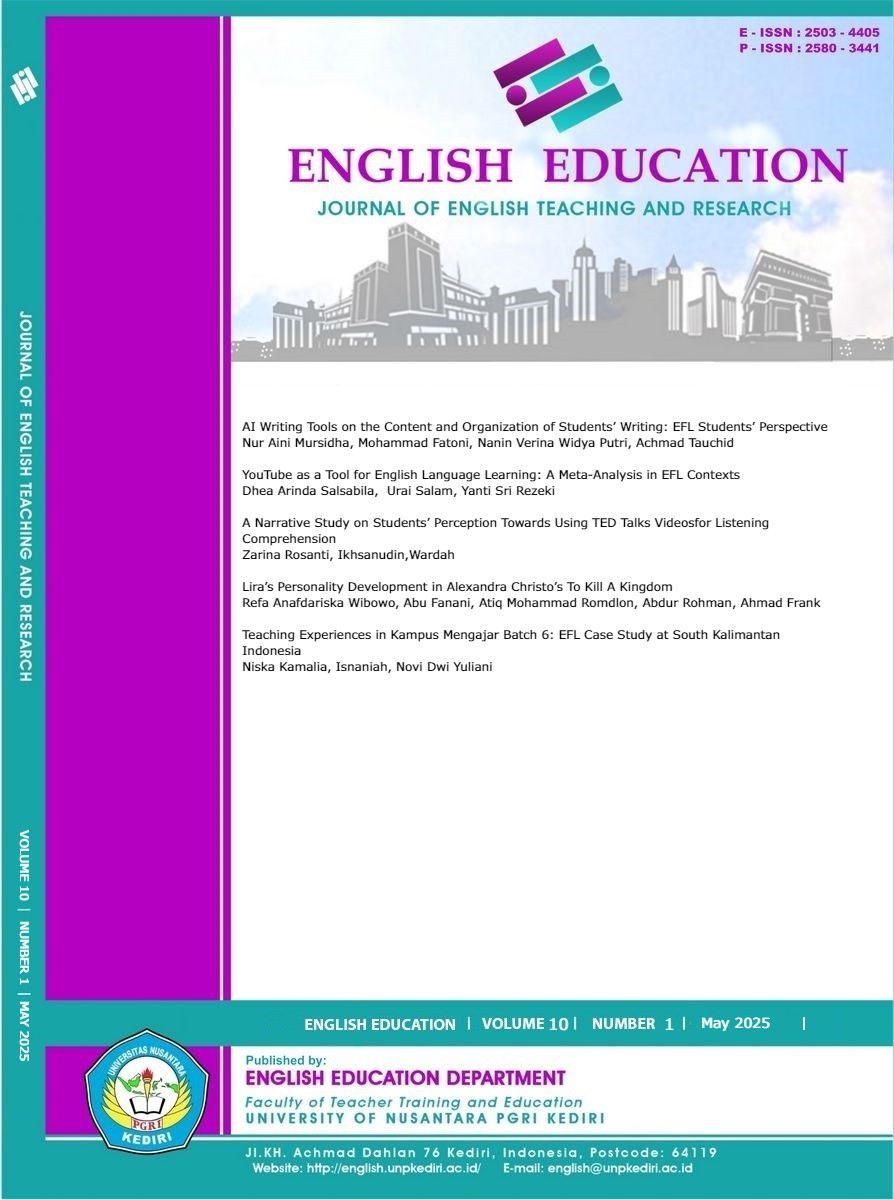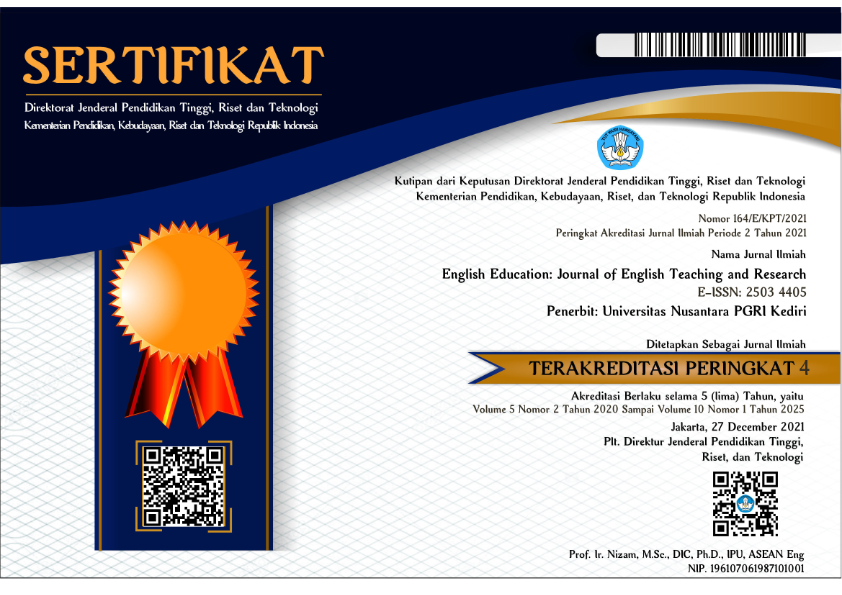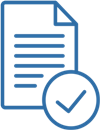English Language Teachers’ Understanding and Implementation of Self-Assessment: A Multiple Case Study
DOI:
https://doi.org/10.29407/jetar.v10i1.23874Keywords:
english classroom, implementation, multiple case study, self-assessment, English classroom, implementation; multiple case study, understandingAbstract
This case study investigates English language teachers’ understanding and implementation of self-assessment (SA) in elementary, junior high, and senior high school levels. The research focuses on exploring how English teachers’ understanding of SA and how SA is applied in classroom settings. Data were collected through interviews and classroom observations involving five English teachers from a private school in East Jakarta, selected through purposeful sampling to capture diverse teaching experiences and grade levels. The findings indicate that all participants demonstrated a clear understanding of SA, its classroom implementation varied. Factors such as student age influenced the adaptation of SA practices, with younger learners requiring more guided approaches. Additionally, the frequency of SA use ranged from regular integration throughout lessons to limited use at the end of the term. These insights suggest areas for improvement, such as promoting more consistent use of SA throughout the learning process. The study offers practical examples of how English language teachers incorporate SA, providing guidance for educators aiming to enhance student engagement and autonomy through reflective learning practices.
Downloads
References
Adiguna, I. W. B., Dewi, N. L. P. E. S., Paramartha, A. A. G. Y., & Wahyuni, L. G. E. (2023). Teacher’s Perception of Self-Assessment in English Writing Competency for Junior High School Students. Jurnal Pendidikan Bahasa Inggris Undiksha, 11(1), 104–112. https://doi.org/10.23887/jpbi.v11i1.64935
Alek, A., Marzuki, A. G., Farkhan, M., & Deni, R. (2020). Self-assessment in exploring EFL students’ speaking skill. Al-Ta Lim Journal, 27(2), 208–214.https://doi.org/10.15548/jt.v27i2.613
Alfianti, M., & Aminin, Z. (2022). The implementation of self-assessment in EFL students’ speaking performance. Journal of English Language Teaching and Literature (JELTL), 5(2), 103-116. https://doi.org/10.47080/jeltl.v5i2.2043
Andrade HL (2019) A Critical Review of Research on Student Self-Assessment. Front. Educ. Frontiers in Education, 4(87). 1-13. https://doi.org/10.3389/feduc.2019.00087
Baidoo-Anu, D., Asamoah, D., & Adusei, A. (2023). Teachers’ beliefs and attitudes towards students’ self-assessment: A latent profile analysis. International Journal of Educational Research Open, 5, 100275.https://doi.org/10.1016/j.ijedro.2023.100275
Barana, A., Boetti, G., & Marchisio, M. (2022). Self-assessment in the development of mathematical problem-solving skills. Education Sciences, 12(2), Article 81.https://doi.org/10.3390/educsci12020081
Bouncken, R.B., Czakon, W. & Schmitt, F. Purposeful sampling and saturation in qualitative research methodologies: recommendations and review. Rev Manag Sci (2025). https://doi.org/10.1007/s11846-025-00881-2
Brown, G. T. L., & Harris, L. R. (2013). Student Self-Assessment. In J. H. McMillan (Ed.), The SAGE Handbook of Research on Classroom Assessment (pp. 367-393). Thousand Oaks. https://doi.org/10.4135/9781452218649.n21
Dahal, N., Neupane, B. P., Pant, B. P., Dhakal, R. K., Giri, D. R., Ghimire, P. R., & Bhandari, L. P. (2024). Participant selection procedures in qualitative research: Experiences and some points for consideration. Frontiers in Research Metrics and Analytics.https://doi.org/10.3389/frma.2024.1512747
De Jong, L., Meirink, J., & Admiraal, W. (2022). Teacher learning in the context of teacher collaboration: Connecting teacher dialogue to teacher learning. Research Papers in Education, 37(6), 1165–1188.https://doi.org/10.1080/02671522.2021.1931950
Fischer, J., Bearman, M., Boud, D., & Tai, J. (2023). How does assessment drive learning? A focus on students’ development of evaluative judgement. Assessment & Evaluation in Higher Education, 49(2), 233–245. https://doi.org/10.1080/02602938.2023.2206986
Guskey, T. R. (2018). Does pre-assessment work? Educational, School, and Counseling Psychology Faculty Publications. 75(5), 52–57. Retrieved from: https://uknowledge.uky.edu/edp_facpub/49.
Harris, L. R., & Brown, G. T. L. (2018). Using self-assessment to improve student learning (1st ed.). Routledge. https://doi.org/10.4324/9781351036979
Kalykbayeva, A., Autayeva, A., Orazayeva, G., Kassymzhanova, G., Zhigitbekova, B., & Bekmuratova, G. (2022). The attitude of teachers toward students’ self-assessment of educational achievements in inclusive education lessons. Cypriot Journal of Educational Sciences, 17(2).https://doi.org/10.18844/cjes.v17i2.6859
Karaman, P. (2021). The impact of self-assessment on academic performance: A meta-analysis study. International Journal of Research in Education and Science, 7(4), 1151–1166.https://doi.org/10.46328/ijres.2344
Kawuryan, S. P., Sayuti, S. A., Aman., & Dwiningrum, S. I. A. (2021). Teachers Quality and Educational Equality Achievements in Indonesia. International Journal of Instruction, 14(2), 811-830. https://doi.org/10.29333/iji.2021.14245a
Khonamri, F., Kralik, R., Viteckova, M., & Petrikovicova, L. (2021). Self-assessment and EFL literature students’ oral reproduction of short stories. European Journal of Contemporary Education, 10(1), 77–88.https://doi.org/10.13187/ejced.2021.1.77
Kilic, D. (2016). An examination of using self-, peer-, and teacher-assessment in higher education: A case study in teacher education. Higher Education Studies, 6(1), 136–144.https://doi.org/10.5539/hes.v6n1p136
Kulkarni, C., Wei, K. P., Le, H., Chia, D., Papadopoulos, K., Cheng, J., et al. (2015). Peer and self-assessment in massive online classes. In H. Plattner, C. Meinel, & L. Leifer (Eds.), Design thinking research (pp. 131–168). Springer.https://doi.org/10.1007/978-3-319-19641-1_8
Latkovska, E., & Aleksejeva, S. (2021). Self-assessment of English reading skills in grade 6. Human, Technologies and Quality of Education, 2021, 621–634.https://doi.org/10.22364/htqe.2021.49
Lesmana, N., & Rokhyati, U. (2020). The implementation of doing self-assessment in higher education. Journal of English Language Studies, 5(1), 60-72.http://jurnal.untirta.ac.id/index.php/JELS
Liu, H., & Brantmeier, C. (2019). know English”: Self-Assessment of Foreign Language Reading and Writing Abilities among Young Chinese Learners of English. System, 80, 60-72. https://doi.org/10.1016/j.system.2018.10.013
Liu, N. F., & Carless, D. (2006). Peer feedback: The learning element of peer assessment. Teaching in Higher Education, 11(3), 279–290.https://doi.org/10.1080/13562510600680582
Mahapoonyanont, N. (2020). Student self-assessment: A powerful tool of assessment for learning. International Journal of Management and Applied Science, 6 (7), 2394–7926. http://dx.doi.org/10.30870/jels.v5i1
Mahayukti, G. A., Gita, I. N., Suarsana, I. M., & Hartawan, I. G. N. Y. (2017). The effectiveness of self-assessment toward understanding the mathematics concept of junior school students. International Research Journal of Engineering, IT & Scientific Research, 3(6), 116-124.https://sloap.org/journals/index.php/irjeis/article/view/16
Majumdar, A. (2018). Thematic analysis in qualitative research. In Qualitative techniques for workplace data analysis (pp. 197–220). IGI Global.https://doi.org/10.4018/978-1-5225-5366-3.ch009
Mäkipää, T. (2021). Students’ and teachers’ perceptions of self-assessment and teacher feedback in foreign language teaching in general upper secondary education: A case study in Finland. Cogent Education, 8(1).https://doi.org/10.1080/2331186X.2021.1978622
Manik, S., Sembiring, M., Padang, I., Manurung, L. (2022). Theory of Bandura's Social Learning in The Process Of Teaching at SMA Methodist Berastagi Kabupaten Karo. Jurnal Visi Pengabdian Kepada Masyarakat. 3. 85-96. https://doi.org/10.51622/pengabdian.v3i2.729
Masruria, W. W., & Anam, S. (2021). Exploring self-assessment of speaking skill by EFL high school students. Linguistic, English Education and Art (LEEA) Journal, 4(2), 387–400.https://doi.org/10.31539/leea.v4i2.2285
McGarr, O., & Clifford, A. M. (2013). "Just enough to make you take it seriously": Exploring students’ attitudes towards peer assessment. Higher Education, 65(6), 677–693.https://doi.org/10.1007/s10734-012-9570-z
Meletiadou, E. (2021). Exploring the impact of peer assessment on EFL students’ writing performance. IAFOR Journal of Education: Language Learning in Education, 9(3), 77–95.10.22492/ije.9.3.05
Moncayo Mendoza, M. P., & Ramirez Avila, M. R. (2022). Self-assessment to improve speaking skills: A brief action research. Sapienza: International Journal of Interdisciplinary Studies, 3(4), 351–362.https://doi.org/10.51798/sijis.v3i6.492
Muasya, J. N., & Mulwa, P. K. (2023). Pilot study, a neglected part of qualitative and quantitative research process: Evidence from selected PhD thesis and dissertations. Higher Education Research, 8(4), 115–123.https://doi.org/10.11648/j.her.20230804.11
Olson, J., & Krysiak, R. (2021). Rubrics as tools for effective assessment of student learning and program quality. In Handbook of Research on Teacher Education and Professional Development (Chapter 10).https://doi.org/10.4018/978-1-7998-7653-3.ch010
Oswalt, S. G. (2013). Identifying formative assessment in classroom instruction: Creating an instrument to observe use of formative assessment in practice [Doctoral dissertation, Boise State University]. Boise State University Theses and Dissertations.
Otero-Saborido, F. M., Torreblanca-Martínez, V., & González-Jurado, J. A. (2021). Systematic review of self-assessment in physical education. International Journal of Environmental Research and Public Health, 18(2), 1–12.https://doi.org/10.3390/ijerph18020766
Palinkas, L. A., Horwitz, S. M., Green, C. A., Wisdom, J. P., Duan, N., & Hoagwood, K. (2015). Purposeful sampling for qualitative data collection and analysis in mixed method implementation research. Administration and Policy in Mental Health and Mental Health Services Research, 42(5), 533–544. https://doi.org/10.1007/s10488-013-0528-y
Panadero, E., & Alonso-Tapia, J. (2013). Self-assessment: Theoretical and practical connotations. When it happens, how is it acquired and what to do to develop it in our students. Electronic Journal of Research in Educational Psychology, 11(2), 551–576.https://doi.org/10.14204/ejrep.30.12200
Panadero, E., & Brown, G. T. L. (2016). Teachers’ reasons for using peer assessment: Positive experience predicts use. European Journal of Psychology of Education, 32(1), 133–156.https://doi.org/10.1007/s10212-015-0282-5
Panadero, V. C. (2017). The use of self-assessment prompts to enhance students' learning. Educational Psychologist, 52(2), 100–112.https://doi.org/10.1080/00461520.2017.1332636
Rezai, A., Namaziandost, E., Rahimi, S. (2022). Developmental potential of self-assessment reports for high school students’ writing skills: A qualitative study. Teach English as a Second Lang Q (TESL Q). 41(2), 163-203.
Shatri, Z. G., Këndusi, V., Gaxhiqi, B., Zabeli, N., & Vishaj, A. (2022). Student self-assessment practices in lower secondary education in Kosovo. Journal of Educational and Social Research, 12(1), 97–105.https://doi.org/10.36941/jesr-2022-0009
Shattuck, S. D. (2021). The slow professor: Challenging the culture of speed in the academy. Community Literacy Journal, 11(2), 80–83. https://doi.org/10.25148/clj.11.2.009137
Siregar, S. D., Melati, E., & Wahyuni, S. (2021). Self-assessment optimization through WhatsApp features for increasing students’ listening comprehension. English Journal for Teaching and Learning, 9(1), 13 – 24. http://jurnal.iainpadangsidimpuan.ac.id/index.php/EEJ
Takarroucht, K. (2021). The effect of self-assessment on the development of EFL reading comprehension skills. Journal of English Education and Teaching, 5(2), 231–247.https://doi.org/10.33369/jeet.5.2.231-247
Takarroucht, K. (2022). The effect of self-assessment on the development of EFL writing self-efficacy: A case of Algerian higher education. International Journal of Language Education, 6(2), 157–168.https://doi.org/10.26858/ijole.v6i2.22065
Takrouni, A., & Assalahi, H. (2022). An inquiry into EFL teachers’ perceptions of integrating student self-assessment into teaching academic writing at a Saudi university. Theory and Practice in Language Studies, 12(3), 456–466.https://doi.org/10.17507/tpls.1203.06
Thanh, N. T. (2020). Promoting learner autonomy through self-assessment and reflection. VNU Journal of Foreign Studies, 35(6), 104–119.https://doi.org/10.25073/2525-2445/vnufs.4483
Vasu, K. A., Mei Fung, Y., Nimehchisalem, V., & Md Rashid, S. (2022). Self-regulated learning development in undergraduate ESL writing classrooms: Teacher feedback versus self-assessment. RELC Journal, 53(3), 612–626.https://doi.org/10.1177/0033688220957782
Wilson, C. (2014). Semi-Structured Interviews. In C. Wilson, Ed., Interview Techniques for UX Practitioners (pp. 23-41). Morgan Kaufmann. Retrieved from: https://doi.org/10.1016/b978-0-12-410393-1.00002-8
Yan, Z. (2020). Self-assessment in the process of self-regulated learning and its relationship with academic achievement. Assessment & Evaluation in Higher Education, 45(2), 224–238.https://doi.org/10.1080/02602938.2019.1629390
Yan, Z. (2022). Student self-assessment as a process for learning. Routledge.Retrieved from:https://doi.org/10.4324/9781003162605
Yan, Z., Chiu, M. M., & Ko, P. Y. (2020). Effects of self-assessment diaries on academic achievement, self-regulation, and motivation. Assessment in Education: Principles, Policy & Practice, 27(5), 562–583. https://doi.org/10.1080/0969594X.2020.1827221
Yin, R. K. (2018). Case Study Research and Applications: Design and Methods (6th ed.). Thousand Oaks, CA: Sage.
Zulkifli, H., & Azman, N. A. (2021). Students’ self-assessment on Hikmah pedagogy in Islamic education. Religación. Revista de Ciencias Sociales y Humanidades, 6(29), e210805.https://doi.org/10.46652/rgn.v6i29.805
Downloads
Published
Issue
Section
License
Copyright (c) 2025 Ariyanti, Nailiyatul Fitriyah, Maya Defianty

This work is licensed under a Creative Commons Attribution-ShareAlike 4.0 International License.
Authors who publish with this journal agree to the following terms:
- Copyright on any article is retained by the author(s).
- The author grants the journal, the right of first publication with the work simultaneously licensed under a Creative Commons Attribution License that allows others to share the work with an acknowledgment of the work’s authorship and initial publication in this journal.
- Authors are able to enter into separate, additional contractual arrangements for the non-exclusive distribution of the journal’s published version of the work (e.g., post it to an institutional repository or publish it in a book), with an acknowledgment of its initial publication in this journal.
- Authors are permitted and encouraged to post their work online (e.g., in institutional repositories or on their website) prior to and during the submission process, as it can lead to productive exchanges, as well as earlier and greater citation of published work.
- The article and any associated published material is distributed under the Creative Commons Attribution-ShareAlike 4.0 International License








 Article template
Article template



